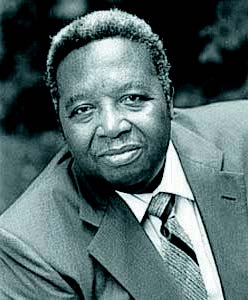
Dr. Charles Eric Lincoln was born on June 23, 1924, in Athens, Alabama. Lincoln is best known as a distinguished scholar, author, and lecturer on the Sociology of African American Religion, Race, and Ethnic Relations in the United States. He authored, co-authored, or edited numerous books and articles about the African American experience. Lincoln authored several landmark works including The Black Muslims in America (1961), The Black Church Since Frazier (1974), and Race, Religion and the Continuing American Dilemma (1984). In 1988, he wrote The Avenue, Clayton City, a novel dedicated to his friend, and fellow civil rights author, Alex Haley. The novel won the Lillian Smith Award for Best Southern Fiction in 1988, as well as the International Black Writers’ Alice Browning Award in 1989.
At an early age Lincoln was abandoned by his parents and raised by his maternal grandparents, Mattie Sowell Lincoln and Charles Less Lincoln. He attended the Trinity School in Athens, an institution created by the New England-based Congregational Church to meet the secondary education needs of African Americans in that community. While there Lincoln picked cotton to earn money to pay for his tuition and school supplies. Lincoln was an excellent student and, in 1939, graduated valedictorian.
After high school Lincoln moved to Chicago to continue his studies, working during the day and taking night classes at the University of Chicago. In 1941, after the bombing of Pearl Harbor, Lincoln tried to enlist in the Navy but was refused enlistment because of his race. Ironically, in 1943, he was drafted into the United States Navy and served until the end of World War II. After the war he moved to Memphis, Tennessee to enroll in Lemoyne College where he earned a Bachelor of Arts in philosophy and sociology. Lincoln eventually earned five degrees, including a Bachelor of Divinity and Master of Education from the University of Chicago, Master of Philosophy from Fisk University, and a Doctor of Philosophy in Social Ethics from Boston University. In 1957, he was ordained as a Methodist minister.
In addition to the many books, research studies, articles, and poetry Lincoln authored, he held both academic and administrative positions at Clark College (now Clark-Atlanta University) in Atlanta for 11 years. From 1962 to 1972, Lincoln served as adjunct or visiting professor at Portland State College (now Portland State University, Oregon), Union Theological Seminary (New York City), and Fordham University (New York City). In 1970, Lincoln became the founding president of the Black Academy of Letters. In 1973, he returned to Fisk as Professor of Religion and of Sociology and also as chairman of the Department of Religion and Philosophical Studies. In 1976, Lincoln accepted a position at Duke University as Professor of Religion and Culture and taught there until his retirement in 1993. In 1990, he was cited by Pope John Paul II for “scholarly service to the church” and in 1991, he was named the William R. Kenan, Jr. Distinguished Professor Emeritus of Religion and Culture.
Lincoln was diagnosed with diabetes in the 1980s and his health began to decline, but that did not keep him from continuing his research, publishing, and teaching. C. Eric Lincoln died on May 14, 2000, at the age of 75 in Durham, North Carolina.
Resources
-
Encyclopedia of Alabama http://www.encyclopediaofalabama.org/article/h-3089
-
BlackPast.org http://www.blackpast.org/aah/lincoln-charles-eric-1924-2000

